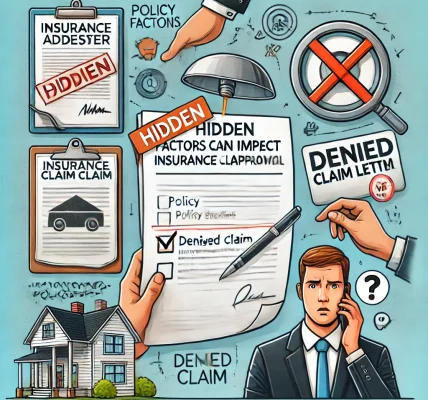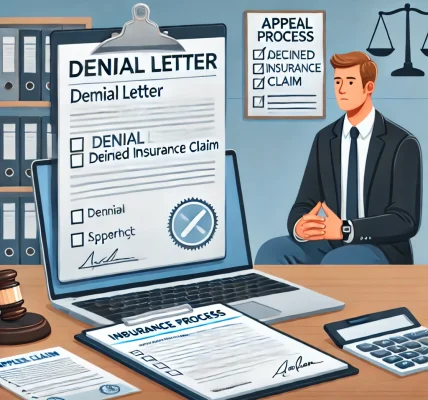Introduction
When filing an insurance claim, pre-existing conditions can significantly affect the approval, settlement, or denial of your claim. Insurance providers carefully review policyholders’ medical or financial histories to assess their risk exposure before approving claims. Understanding how pre-existing conditions impact different types of insurance claims can help you prepare and maximize your chances of receiving compensation.
This DIY guide will walk you through the impact of pre-existing conditions on insurance claims and provide actionable tips to navigate the process smoothly.
What Are Pre-Existing Conditions?
A pre-existing condition is any illness, injury, or health-related issue that a policyholder had before obtaining an insurance policy. This term is most commonly associated with health and life insurance but can also apply to disability, travel, and auto insurance.
Common Types of Pre-Existing Conditions
- Health Conditions: Diabetes, heart disease, cancer, asthma, high blood pressure.
- Chronic Illnesses: Arthritis, epilepsy, depression, or other long-term medical issues.
- Previous Injuries: Prior fractures, surgeries, or recurring back pain.
- Mental Health Disorders: Anxiety, bipolar disorder, PTSD.
How Pre-Existing Conditions Affect Different Types of Insurance Claims
1. Health Insurance Claims
- Many insurers do not cover treatments related to pre-existing conditions within a waiting period (typically 12–48 months).
- The Affordable Care Act (ACA) prohibits health insurers from denying coverage based on pre-existing conditions in certain regions like the U.S.
- Some international policies may still exclude coverage for pre-existing illnesses.
Tip: Review your policy’s waiting period for pre-existing conditions and check if you qualify for special exemptions or coverage riders.
2. Life Insurance Claims
- If a policyholder dies due to a pre-existing condition that was undisclosed at the time of application, the claim could be denied.
- Policies with a contestability period (typically two years) allow insurers to investigate deaths caused by undisclosed pre-existing conditions.
Tip: Always disclose your full medical history when applying for life insurance to avoid claim disputes.
3. Travel Insurance Claims
- Many travel insurers exclude claims for medical emergencies arising from pre-existing conditions.
- Some policies allow travelers to purchase coverage for pre-existing conditions through a waiver.
- A claim may be denied if a policyholder experiences complications from a known health issue.
Tip: If you have a medical condition, look for travel insurance plans that offer pre-existing condition waivers.
4. Disability Insurance Claims
- If an individual becomes disabled due to a pre-existing condition, the claim may be denied.
- Some policies exclude disabilities arising from conditions that existed before coverage started.
- Short-term disability plans are more likely to have stricter exclusions than long-term policies.
Tip: Get a doctor’s statement and medical records to prove how your current disability differs from any prior conditions.
5. Auto Insurance Claims
- If an accident aggravates a pre-existing injury (e.g., back pain), insurers may limit or deny coverage for treatment.
- Some insurers use medical history to argue that an injury existed before the accident occurred.
Tip: Work with medical professionals to document how the accident directly caused or worsened an injury.
How to Strengthen Your Insurance Claim When You Have a Pre-Existing Condition
1. Be Honest About Your Medical History
- Never withhold information about pre-existing conditions when applying for insurance.
- False or omitted details may result in claim denial or policy cancellation.
2. Review Your Policy Terms Thoroughly
- Understand waiting periods, exclusions, and limitations for pre-existing conditions.
- Check for available riders or waivers that may extend coverage.
3. Provide Strong Medical Evidence
- Obtain medical records, doctor’s statements, and test results supporting your claim.
- Ensure the documentation proves that the claimed condition is unrelated to any pre-existing illness.
4. Appeal Denied Claims When Necessary
- If your claim is denied due to a pre-existing condition, request a detailed explanation.
- Provide additional evidence or seek help from a claims attorney if necessary.
5. Work with an Insurance Expert
- Consulting an insurance broker or legal professional can help you find policies that better suit your health history.
- A claims adjuster or attorney can assist if you face claim disputes.
Conclusion
Pre-existing conditions can complicate insurance claims, but understanding your policy, maintaining transparency, and providing strong evidence can increase your chances of a successful claim. Whether you’re dealing with health, life, travel, disability, or auto insurance, being prepared and proactive is key to securing the coverage you need.



